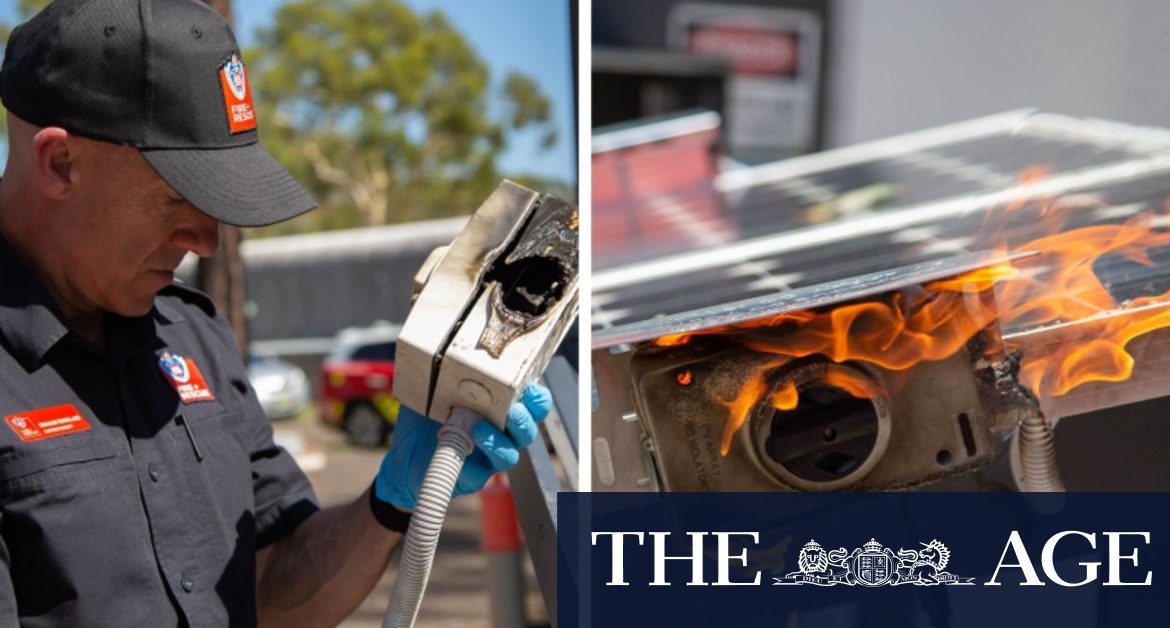“The irony’s not lost on me. They’re there for firefighters but they’re creating their own fire risks,” Superintendent Kingsland said.
“We’re trying to avoid a worst-case scenario of a house catching fire and potentially someone getting severely injured or even killed.”
Superintendent Graham Kingsland with a burnt out DC isolators. Credit:Fire and Rescue NSW
According to the regulator, a record 101,224 solar panels systems were installed in NSW last year, a 26 per cent jump on the previous record set in 2011.
At the same time, only 619 random inspections were completed in the 12 months to June 30 last year, compared with 954 inspections the previous year.
The Herald compared the number of inspections conducted each year (which the regulator reports by financial years) with the number of new solar panel installations (reported by calendar years).
The number of inspections each year fluctuated, from 749 in 2016-17, rising to 954 in 2018-19 before falling to 619 in 2019-20. Between 2017 and 2020 the number of new solar panel systems more than doubled from 43,252 to 101,224.
A spokeswoman for the regulator acknowledged the rate of inspections has declined, but said it remained “statistically significant”. She also noted the “overall downward trend” in the number of unsafe and potentially unsafe systems detected since the inspection program began.
Of the 619 inspections in 2019-20, inspectors found 12 unsafe systems and 117 substandard systems, roughly in line with annual trends.
The spokeswoman said the federal regulator “does not have powers to fine the installers or order rectification” because enforcement falls under the jurisdiction of states and territories.
The industry has a complicated compliance structure, with three agencies responsible for different aspects of the job. The federal Clean Energy Regulator randomly inspects solar panel installations, NSW Fair Trading monitors electricians’ licensing, and SafeWork NSW is responsible for general workplace safety, such as working from heights.
Finn Peacock, an electrical engineer and founder of comparison website Solar Quote, said random inspections were “not enough” and called for state regulators to inspect every new installation to weed out dodgy operators.

The isolator switch has been blamed for the rise in rooftop fires. Credit:Fire and Rescue NSW
“If we had 100 per cent and independent inspections and strict sanctions, the cheapest end of town would have to factor high-quality installs on every job to stay in business,” he said.
Industry experts have been lobbying to make the isolator switch voluntary, with the Clean Energy Regulator saying it’s mandatory only in Australia.
The regulator said in a June 2020 report that the revised national safety standard was expected to take effect in late-2021, but state and territory governments were best placed to decide whether, on the balance of risks, rooftop DC isolators should be required.
Loading
But Superintendent Kingsland said if isolation switches were removed, alternative safeguards were required to protect firefighters and other first responders from the risk of electric shock.
“Whatever the solution is, something needs to be done,” he said.
A NSW government spokesperson said Fair Trading inspectors visited about 100 worksites across Sydney in November during “a blitz targeting wrongdoers in the solar industry”.
Twenty infringement notices worth $19,250 were issued, including for unlicensed work, while seven cautions were issued for less serious offences. Several breaches are still being investigated, the spokesperson said.
SafeWork NSW has recorded two fatalities and 48 serious incidents with solar installation over the past three years.
The Clean Energy Council, the industry peak body, said in the past six years it had improved the safety of rooftop DC isolator switches by introducing additional installation requirements.
A spokeswoman said consumers should ensure their solar is installed by a council-accredited technician and ensure the system follows “an annual maintenance schedule, just like servicing your car”.
Josh Dye is a news reporter with The Sydney Morning Herald.
Angus Thompson is an Urban Affairs reporter for The Sydney Morning Herald.
Most Viewed in National
Loading







